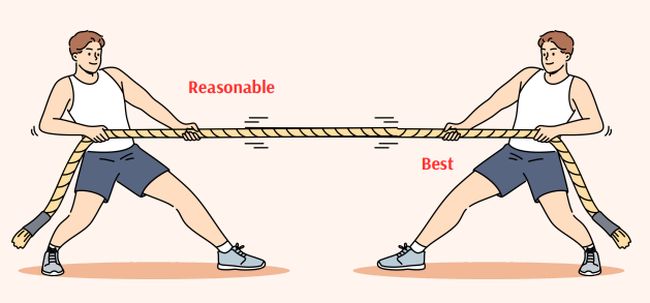Introduction:
Tweaking the language in contracts is often considered a timeconsuming process and sometimes contracts are executed on dotted lines to avoid negotiations. However, avoiding this exercise could land one in unanticipated situations. Pacta sunt servanda is a traditional doctrine which means that agreements should be honored. For one to honor the agreements, the parties must understand their obligations in the same manner and in the same sense i.e. consensus id idem. Sometimes, certain agreements contain typical phrases which alter the obligations of the parties. This article aims to elaborate the interpretation associated with these common phrases.1.
A. Reasonable efforts versus best efforts:
Often parties debate over the extent of obligations imposed on them. While the service providers and vendors may want to limit their obligations to reasonable efforts, the customer or the service recipient may insist on it being on best efforts.
Linguistically and logically, it is easy to determine that the two standards are distinct and whether a party actually applied reasonable efforts or best efforts is always a question of fact. Interestingly there is a guiding light in the form of a judgement which elaborates this distinction. In Atmospheric Diving Systems Inc. v. International Hard Suits Inc2 the Court laid down the following tests in order to delineate the scope of "best efforts" clauses in commercial contracts:
- Best efforts means taking, in good faith, all reasonable steps to achieve the objective, carrying the process to its logical conclusion and leaving no stone unturned.
- Best efforts includes doing everything known to be usual, necessary and proper for ensuring the success of the endeavour.
- The meaning of best efforts is, however, not boundless. It must be approached in the light of the particular context, the parties to it and the contract's overall purpose as reflected in its language.
- While best efforts of the defendant must be subject to such overriding obligations as honesty and fair dealing, it is not necessary for the plaintiff to prove that the defendant acted in bad faith.
- Evidence that the defendant, had it acted diligently, could have satisfied the best efforts is relevant evidence that the defendant did not use its best efforts.
These are just guidelines and when a party actually discharges its obligations it will have to be seen on a case to case basis, whether best efforts have been applied or not.

B. Impossibility versus Commercial hardship:
With obligations come certain exceptions also. Statutorily, section 56 of the Contract Act specifically provides that a contract to do an act which, after the contract is made, becomes impossible, or, by reason of some event which the promisor could not prevent, unlawful, becomes void when the act becomes impossible or unlawful.
For instance, if A, an architect entered into a contract with B, a builder that A shall ensure that the construction of 2 floors would get done by 2nd January 2025. However, in the month of July, the heavy rains in Mumbai lash the building and there is a major damage to the building. A may claim extension of time frames due to such damage but if A was aware that Mumbai generally expects rains of this nature, was it reasonable on A's part to make commitment of this nature?
There have been cases wherein parties disagree on whether a particular circumstance should be treated as an impossibility. Force majeure clause is generally incorporated in agreements to avoid such disagreements. A common example can be seen when a party claims that the price of the raw material has multiplied astronomically and thus the agreement is commercially unviable.
In a dispute before the Delhi High Court in Coastal Andhra Power Limited v Andhra Pradesh Central Power Distribution Co. Ltd & Others3. In this case the Power Purchase Agreement was entered amongst the Parties and pertained to the long-term supply of coal from Indonesia at a fixed price of USD 24 Per Metric Ton (PMT). Indonesian government enacted Indonesian Regulation in 2010 and the prices of coal escalated by 150 percent, viz. from the contracted rate of USD 24 PMT to USD 60 PMT. Coastal Andhra Power Ltd (CAPL), subsequently issued a notice in 2011 to the respondent claiming to be released under the force majeure clause. CAPL asserted that the performance of the project had 'become unviable' due to the 'exponential increase in coal prices' as a consequence of a sudden and unforeseeable change in the law.
The Power Purchase Agreement contained a force majeure clause to state that they would be discharged if the performance of their obligations was 'prevented, hindered or delayed' due to a force majeure event. However, the exceptions in the clause provided that:
Force majeure shall not include
(i) any event or circumstance which is within the reasonable control of the parties, and (ii) the following conditions, except to the extent that they are consequences of an event of force majeure:
(a) Unavailability, late delivery, or changes in cost of the plant, machinery, equipment, materials, spare parts, fuel or consumables for the Project.
Relying on the clause and certain judicial precedents, the Court did not grant interim relief of stay on invocation of the bank guarantees and held that no prima facie case was made out that a change in Indonesian law and consequential increase in price of coal in Indonesia could amount to force majeure under the Agreement.
Certain countries governed by civil law recognize commercial unviability but common law generally refers to impossibility of performance. If this agreement was governed by different laws, would the decision be different?
C. Agreeing to perform Duties versus Agreeing in fiduciary capacity to perform duties
Accepting a fiduciary role as an advisor or a trustee changes the obligations completely from a legal perspective. In Central Borad of Education vs Aditya Bandopadhyay and others4, the Apex Court elaborated on fiduciary relationship and observed that:
The term `fiduciary relationship' is used to describe a situation or transaction where one person (beneficiary) places complete confidence in another person (fiduciary) in regard to his affairs, business or transaction/s. The term also refers to a person who holds a thing in trust for another (beneficiary). The fiduciary is expected to act in confidence and for the benefit and advantage of the beneficiary, and use good faith and fairness in dealing with the beneficiary or the things belonging to the beneficiary...
... There are also certain relationships where both the parties have to act in a fiduciary capacity .... : a partner vis-`-vis another partner and an employer vis-`-vis employee. An employee who comes into possession of business or trade secrets or confidential information relating to the employer in the course of his employment, is expected to act as a fiduciary and cannot disclose it to others.
Similarly, if on the request of the employer or official superior or the head of a department, an employee furnishes his personal details and information, to be retained in confidence, the employer, the official superior or departmental head is expected to hold such personal information in confidence as a fiduciary, to be made use of or disclosed only if the employee's conduct or acts are found to be prejudicial to the employer.
Parties dealing on contractual terms sometimes use the word fiduciary in certain special contracts like if one is relying totally on a trusted advisor or on an expert completely to develop a specific researched technology. Whether one should accept fiduciary role in a contract should be determined in every case by the provider as the standards of discharging their roles and obligations change a lot when fiduciary relationship is accepted.
D. Accepted vs Deemed to have accepted
Sometimes, agreements provide that in cases of certain notifications, if no rejection is received, the party would be deemed to have accepted the proposition.
For example, A shall notify its rejection for the goods within a period of 7 days and if no rejection is received, the goods would be deemed to have been accepted.
This would imply an active rejection to be sent by a party to avoid this situation. This point is often questioned in the context of delivery of goods. A party may have rejected the goods it received, but if no notification is sent to the seller, are the goods supposed to be accepted?
Section 42 of the Sale of Goods Act specifically provides that the buyer is deemed to have accepted the goods when:
- he intimates to the seller that he has accepted them, or
- when the goods have been delivered to him and he does any act in relation to them which is inconsistent with the ownership of the seller, or
- when, after the lapse of a reasonable time, he retains the goods without intimating to the seller that he has rejected them.
Thus, parties may specifically agree on the reasonability of time within which the goods would be deemed to have been accepted and also provide that an active rejection is necessary. If the contract does not define the same, it may lead todisputes, as one of the parties may retain the goods for a long time and then seek a refund stating that the goods are defective. The judicial determination of what was reasonable time for retention may take considerable time.
Similar contention was adopted by a distributor in Sun Edison Solar Power India v Kumar Pramendra5 decided by the Madras High Court. Here, the Parties had entered into a Distributorship agreement and Sun Edison had supplied 50 solar water pumps to the Respondent. The seller contended that the title to the pumps had passed over to the purchaser and the sale was complete as the payment was received and no rejection was received. The respondent claimed that they were unable to sell the 50 Solar Water Pumps supplied by the petitioner, since the Solar Water Pumps were not of Sun Edison brand, as per the Distributor Agreement, dated 24.02.2014 and thus wanted a refund. The partiesinitiated arbitration and the arbitral award was partly in favor of the respondents.
In the case on hand, it was admitted that the pumps were sent and accepted and paid for and also one correspondence stated that functionality of the demo pump has been excellent and that prospective buyers numbering around 150 to 200 have shown interest in the product. Sun Edison successfully challenged the award before the Madras High Court and the award was specifically set aside on the ground that the arbitrator had not considered section 16,17 and 42 of the Sale of Goods Act6.

E. Performing obligations versus performing obligations in Good faith:
Good faith is recognized under the insurance contracts in India specifically but generally not applied in other generic commercial agreements.
Recently, the Apex Court in Manmohan Nanda v. United Insurance7 summarises the duty of an insurer and an insured to disclose any material facts, "Uberrimae fidei It is observed that insurance contracts are special contracts based on the general principles of full disclosure inasmuch as a person seeking insurance is bound to disclose all material facts relating to the risk involved. Law demands a higher standard of good faith in matters of insurance contracts which is expressed in the legal maxim uberrimae fidei. ..... Good faith forbids either party, by concealing what he privately knows, to draw the other into a bargain from his ignorance of the fact, and his believing the contrary".
Good faith is not defined in the Contract Act of India but in IPC under section 52 which states that nothing is said to be done or believed in "good faith" which is done or believed without due care and attention.
This again brings one back to conduct of the parties i.e. whether a particular act is committed with due care and attention or not. An example for this could be when a party is required to inform or notify another about existence of particular facts or disclosures. The party refrains from making the necessary disclosures and thus the party could be accused of not acting in good faith.
For instance, in an agreement A is required to supply certain products to B by 31st March 2026. A becomes aware of certain circumstances which may not allow him to procure raw materials thereby delaying the delivery date. Is A required to notify B immediately or wait till the factors become evident in market? Well, if A has agreed in good faith to adhere to obligations at all times then A may be required to make the necessary disclosures.
Conclusion
It is evident that accepting obligations and contractual obligations should be done thoughtfully by the parties. Accepting obligations blindly and then expecting speedy reliefs from the court may not always be the best course of action.
Footnotes
1. The article reflects the general work of the authors and the views expressed are personal. No reader should act on any statement contained herein without seeking detailed professional advice.
2. 1994 CanLII 16658 (BC SC)
3. Delhi High Court: FAO (OS) No. 272 of 2012
4. Supreme Court of India: CIVIL APPEAL NO.6454 OF 2011 [Arising out of SLP [C] No.7526/2009]
5. Madras High Court : Arb. O.P. (Com. Div.) No.1 of 2021 and A. No.2097 of 2021
6. The timelines indicate that the parties entered into agreement in 2014. First dispute arose around 2015 and the award was passed on 16th March 2021 and set aside in July 2023.
7. (2022) 4 SCC 582
Originally published by 10 January, 2024
The content of this article is intended to provide a general guide to the subject matter. Specialist advice should be sought about your specific circumstances.

